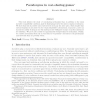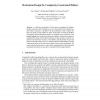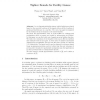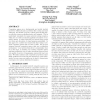WINE
2009
Springer
14 years 6 months ago
2009
Springer
WINE
2009
Springer
14 years 6 months ago
2009
Springer
We argue that users in social networks are strategic in how they post and propagate information. We propose two models — greedy and courteous — and study information propagatio...
WINE
2009
Springer
14 years 6 months ago
2009
Springer
This work initiates the study of cost-sharing mechanisms that, in addition to the usual incentive compatibility conditions, make it disadvantageous for the users to employ pseudon...
WINE
2009
Springer
14 years 6 months ago
2009
Springer
WINE
2009
Springer
14 years 6 months ago
2009
Springer
We propose approximation algorithms under game-theoretic considerations. We indroduce and study the general covering problem which is a natural generalization of the well-studied m...
WINE
2009
Springer
14 years 6 months ago
2009
Springer
We study convergence of ε-Nash dynamics in congestion games when delay functions of all resources are similar. Delay functions are said to be similar if their values are within a...
WINE
2009
Springer
14 years 6 months ago
2009
Springer
A well-known result due to Vickery gives a mechanism for selling a number of goods to interested buyers in a way that achieves the maximum social welfare. In practice, a problem wi...
WINE
2009
Springer
14 years 6 months ago
2009
Springer
Recent results regarding games with congestion-averse utilities (or, congestion-averse games—CAGs) have shown they possess some very desirable properties. Specifically, they hav...
WINE
2009
Springer
14 years 6 months ago
2009
Springer
In one dimensional facility games, public facilities are placed based on the reported locations of the agents, where all the locations of agents and facilities are on a real line. ...
WINE
2009
Springer
14 years 6 months ago
2009
Springer
Congestion games are a fundamental and widely studied model for selfish allocation problems like routing and load balancing. An intrinsic property of these games is that players ...




